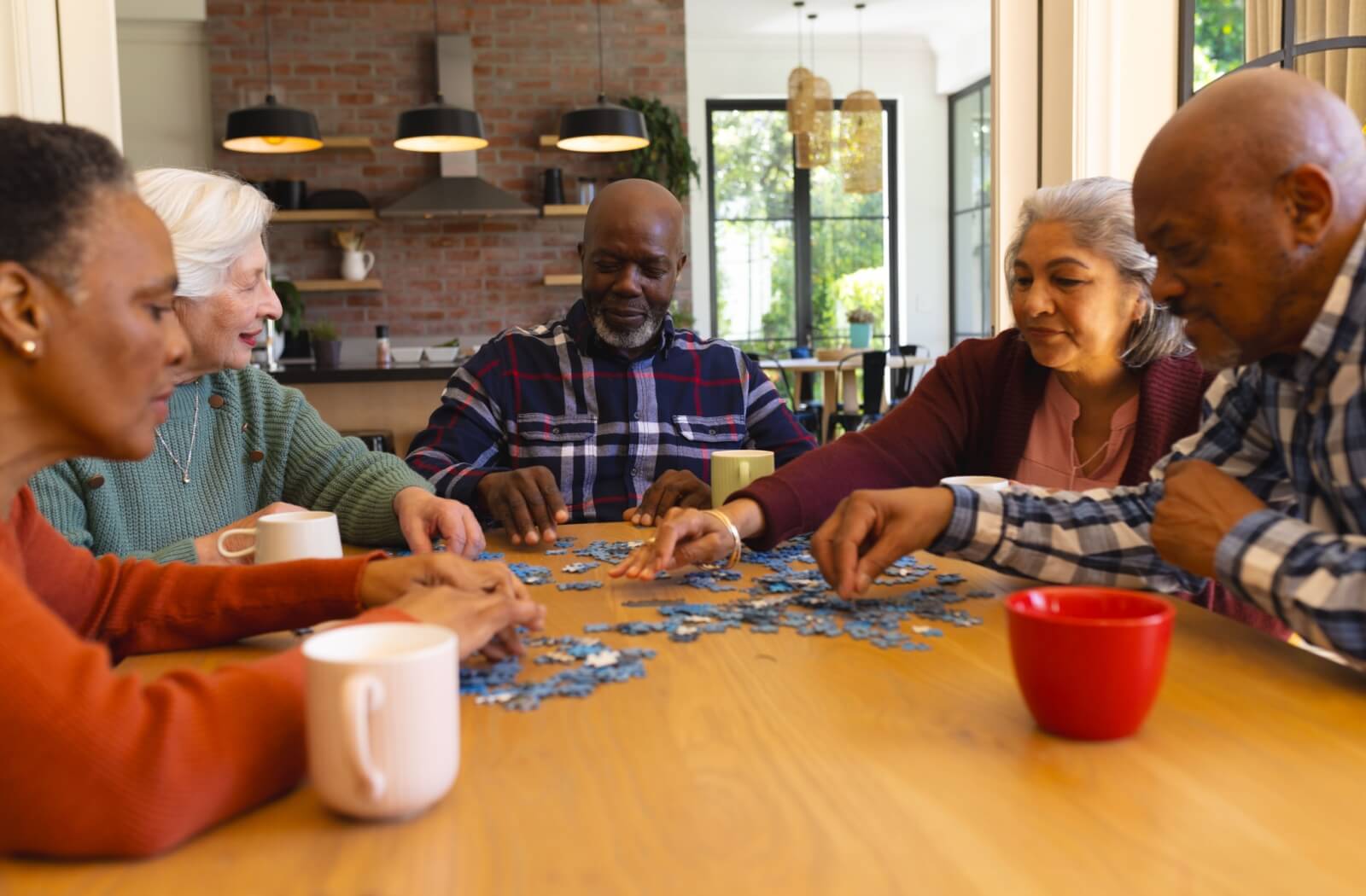As we age, staying mentally active is just as vital as maintaining physical fitness. Many assisted and independent living communities incorporate memory games into their life enrichment programs, recognizing their importance in promoting cognitive health and social engagement.
These communities often provide structured opportunities for residents to enjoy games like trivia, card matching, and puzzles, fostering a sense of connection and mental stimulation in a supportive environment. By offering access to these kinds of life enrichments, senior living communities help residents stay mentally active while creating meaningful opportunities for interaction and enjoyment.
Memory games are important for all seniors, regardless of their cognitive abilities, as they help maintain mental sharpness, enhance problem-solving skills, and promote emotional well-being.
Why Memory Games Matter for Seniors
Mental engagement is vital for seniors to maintain cognitive health. Memory games challenge the brain, helping to improve short-term memory, enhance problem-solving skills, and promote concentration. Regular participation can also reduce the risk of cognitive decline, supporting a higher quality of life.
Incorporating these games into daily routines can create moments of joy, connection, and mental stimulation, benefiting seniors at all cognitive levels. Memory games can be tailored to individual needs, making them accessible and enjoyable for everyone.
Memory Games for Seniors to Try
1. Card Matching Game
This timeless activity involves flipping over cards to find matching pairs. Card matching helps sharpen short-term memory and focus, offering a fun challenge that can be enjoyed alone or in groups. Adding themes such as animals or flowers makes the game more engaging, while increasing the number of cards or setting a time limit can elevate the difficulty.
2. Sudoku
Sudoku is a classic number puzzle that requires logical thinking and pattern recognition. Filling in a 9×9 grid with numbers provides mental stimulation and enhances problem-solving abilities. The game is available in various difficulty levels, making it suitable for seniors of different skill sets. It can also be a social activity, with group Sudoku sessions or friendly competitions.
3. Word Search Puzzles
Word searches offer a relaxing yet stimulating activity. Seniors search for hidden words within a grid, often based on a theme such as nature or hobbies. This activity improves pattern recognition, vocabulary, and focus. Personalized word searches, featuring names or places meaningful to the individual, can make the activity even more enjoyable.
4. Jigsaw Puzzles
Jigsaw puzzles are excellent for exercising the brain while creating something beautiful. Seniors work to assemble pieces into a complete image, improving visual-spatial reasoning and patience. Puzzles with large, easy-to-handle pieces and vibrant designs are particularly suited for seniors. Completing a puzzle provides a sense of accomplishment and can even be a group activity.
5. Trivia Games
Trivia games involve answering questions on a range of topics, from history and sports to pop culture and geography. These games encourage seniors to recall information and expand their general knowledge. Trivia is also a great social activity, fostering camaraderie when played in groups or teams. For a personalized touch, include trivia questions about the senior’s life or interests.
6. Bingo
Bingo is a beloved classic that’s both simple and entertaining. Players mark off numbers on their cards as they’re called out, aiming to complete a row or pattern. Bingo improves concentration and number recognition while providing an enjoyable group setting. Adding small prizes or themed bingo cards can make the game even more exciting.
7. Memory Box
A memory box is a personalized collection of items that evoke memories and spark storytelling. Seniors can fill their boxes with photos, music, or keepsakes, creating a meaningful connection to the past. Regularly revisiting the box can stimulate long-term memory and encourage communication, providing both emotional and cognitive benefits.

Tips for Incorporating Memory Games
- Create a routine: Schedule memory games into a daily or weekly routine to establish consistency and anticipation.
- Focus on interests: Choose games that align with the senior’s interests, such as puzzles with nature themes or trivia about their favourite hobbies.
- Make it social: Group games foster connection and camaraderie, creating a fun and supportive environment for seniors to interact with others.
- Adapt as needed: Tailor games to fit the senior’s cognitive and physical abilities, ensuring they remain enjoyable and accessible.
Supporting Cognitive Health Beyond Games
While memory games are an excellent way to engage the mind and improve memory, they are only one component of a broader approach to supporting cognitive health. A well-rounded lifestyle that incorporates a variety of options for life enrichment is essential for promoting overall well-being in seniors.
Physical Activity for Seniors
Physical activities, such as light exercise or stretching routines, not only improve physical health but also boost cognitive function by increasing blood flow to the brain. Walking, yoga, or even gentle aerobics can enhance memory and focus while reducing the risk of cognitive decline.
The Importance of Social Interaction
Social interactions play a crucial role in cognitive health as well. Participating in group activities, attending community events, or simply spending time with friends and family helps seniors stay connected and mentally stimulated. Meaningful social engagement has been shown to lower the risk of depression and delay the onset of memory-related conditions.
The Role of Creativity
Creative hobbies are another powerful way to stimulate the brain. Activities such as painting, knitting, gardening, or playing a musical instrument encourage problem-solving, concentration, and emotional expression. These hobbies not only engage the mind but also provide a sense of accomplishment and joy.
Experience Engaging Senior Living at Paul Spring
At Paul Spring, we believe in fostering a vibrant and fulfilling lifestyle where residents can stay mentally, physically, and socially active. Our community offers engaging life enrichment opportunities, including memory games and cognitive enrichment programs, designed to support brain health and overall well-being.
Through RUI FIT, residents can maintain an active and healthy lifestyle, while Leash on Life ensures beloved pets remain an integral part of the family. Lifelong learning opportunities abound with RUI University, and LUXE Unlimited provides relaxing salon and spa services for comfort and self-care.
Whether participating in stimulating memory games, engaging in social activities, or enjoying personalized care, residents at Paul Spring experience a supportive environment that promotes cognitive health and independence. Schedule a tour today to see how our community can enhance your loved one’s quality of life.












